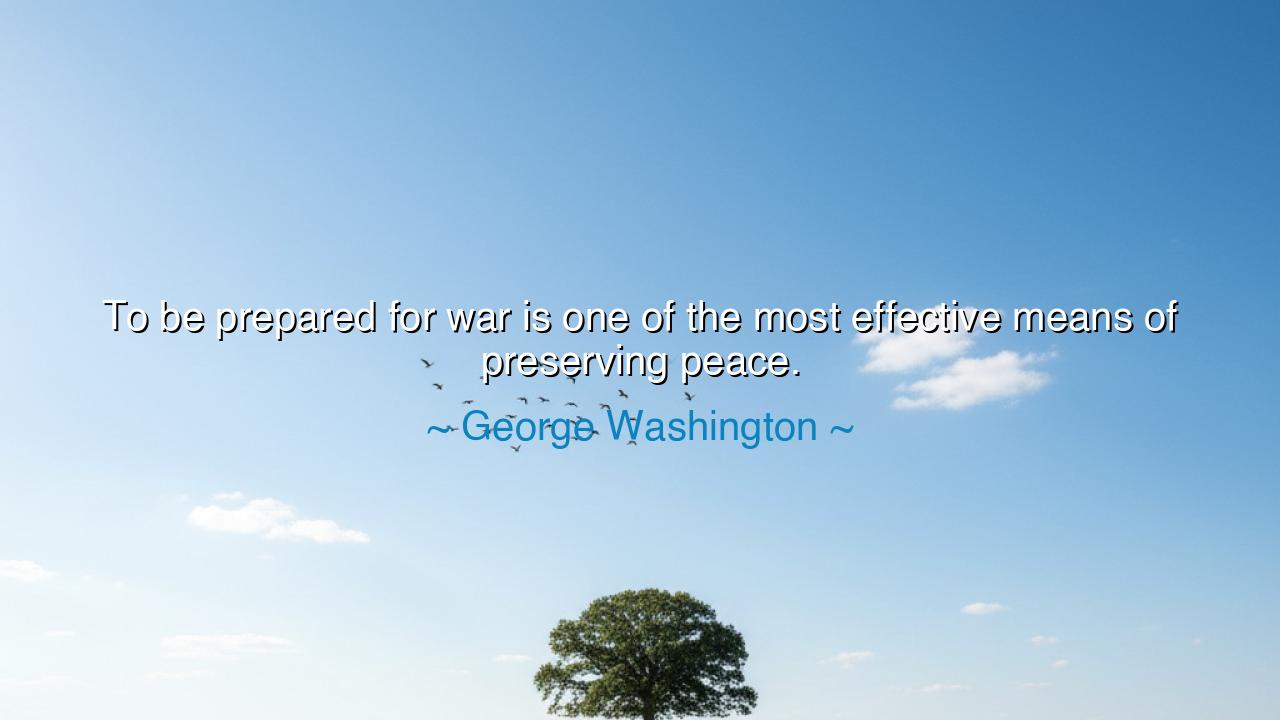
To be prepared for war is one of the most effective means of






“To be prepared for war is one of the most effective means of preserving peace.” Thus declared George Washington, the commander who led a young nation through fire and hardship, and who became its first guardian as president. These words are not a call to bloodshed, nor a glorification of battle. Rather, they are a solemn recognition of the world as it is: a world where ambition, greed, and tyranny often lurk in the hearts of men, waiting for weakness to open the door. Washington, seasoned in the smoke of battle and the silence of strategy, knew well that strength is the shield that keeps peace secure.
When Washington spoke of preparation, he meant more than muskets polished and regiments drilled. He spoke of vigilance, discipline, and the resolve of a people. For if a nation sleeps, thinking that peace is eternal, it will be startled awake by the clamor of invaders at its gates. But if a people stand ready—if their courage is sharpened, their unity firm—then even the most hostile foe will hesitate, for the cost of conquest will seem too high. Thus, paradoxically, the road to peace runs through the readiness for war.
History bears witness to this truth. Consider the long Pax Romana, the Roman Peace, that endured for centuries. It was not achieved by treaties alone, but by legions who marched at the empire’s borders, their armor gleaming, their discipline unyielding. The mere presence of Rome’s strength kept enemies at bay, for they knew the storm that would descend upon them if they struck. Peace was preserved not by softness, but by steadfast might. And so too did Washington see that a young America, fragile in its infancy, could only safeguard its freedom by preparing to defend it with strength.
Think also of the dark years before the Second World War. When nations hesitated, when they disarmed in the hope that goodwill alone would preserve them, tyranny rose with hungry eyes. The failure to prepare became the invitation to conquest. It was only when nations armed themselves, when they gathered their courage and resources, that the tide of oppression was broken and freedom restored. Thus, Washington’s words echo across centuries, as true in his day as in ours: peace is guarded by vigilance, and freedom survives through strength.
Yet let us not mistake this teaching. Washington did not say that we must delight in war, nor that we should rush eagerly into conflict. Preparation is not provocation. The sword kept sharp does not demand blood; it demands only respect. A man who trains his body does not do so to strike the innocent, but so that no tyrant may strike him unopposed. So too with nations: those who keep themselves strong may avoid battle altogether, for their readiness alone deters aggression.
What then is the lesson for our lives? It is this: always be prepared, not only in arms, but in spirit. Prepare your mind with wisdom, that deceit may not ensnare you. Prepare your character with virtue, that temptation may not corrupt you. Prepare your strength with discipline, that adversity may not break you. Just as nations guard peace with readiness, so too do individuals guard their destiny by preparing for the storms of life before they arrive.
In your daily walk, do not wait for crisis to awaken you. Train yourself now, in small ways, so that when the great tests come, you will stand firm. Save, so that hardship finds you not destitute. Learn, so that ignorance cannot deceive you. Love, so that hatred cannot consume you. To live prepared is to live in peace, for the prepared soul walks with confidence, unshaken by the unexpected.
Thus, let Washington’s wisdom echo in your heart: strength is the servant of peace, vigilance the guardian of freedom. Be ready in body, mind, and spirit, not to wage war, but to preserve the blessings of peace. For it is the prepared who rest secure, while the unprepared live forever in fear. And may your preparation, like that of nations, be the surest path to harmony and the safeguard of all you hold dear.






AAdministratorAdministrator
Welcome, honored guests. Please leave a comment, we will respond soon